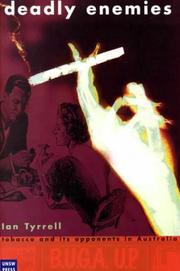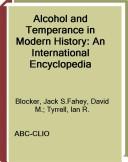| Listing 1 - 8 of 8 |
Sort by
|

ISBN: 0585349355 9780585349350 0868407453 Year: 1999 Publisher: Sydney University of New South Wales Press
Abstract | Keywords | Export | Availability | Bookmark
 Loading...
Loading...Choose an application
- Reference Manager
- EndNote
- RefWorks (Direct export to RefWorks)
Book
ISBN: 9780226197937 022619793X 9780226197760 022619776X Year: 2015 Publisher: Chicago
Abstract | Keywords | Export | Availability | Bookmark
 Loading...
Loading...Choose an application
- Reference Manager
- EndNote
- RefWorks (Direct export to RefWorks)
Long before people were "going green" and toting reusable bags, the Progressive generation of the early 1900s was calling for the conservation of resources, sustainable foresting practices, and restrictions on hunting. Industrial commodities such as wood, water, soil, coal, and oil, as well as improvements in human health and the protection of "nature" in an aesthetic sense, were collectively seen for the first time as central to the country's economic well-being, moral integrity, and international power. One of the key drivers in the rise of the conservation movement was Theodore Roosevelt, who, even as he slaughtered animals as a hunter, fought to protect the country's natural resources. In Crisis of the Wasteful Nation, Ian Tyrrell gives us a cohesive picture of Roosevelt's engagement with the natural world along with a compelling portrait of how Americans used, wasted, and worried about natural resources in a time of burgeoning empire. Countering traditional narratives that cast conservation as a purely domestic issue, Tyrrell shows that the movement had global significance, playing a key role in domestic security and in defining American interests around the world. Tyrrell goes beyond Roosevelt to encompass other conservation advocates and policy makers, particularly those engaged with shaping the nation's economic and social policies-policies built on an understanding of the importance of crucial natural resources. Crisis of the Wasteful Nation is a sweeping transnational work that blends environmental, economic, and imperial history into a cohesive tale of America's fraught relationships with raw materials, other countries, and the animal kingdom.
Conservation of natural resources --- History. --- Government policy --- Roosevelt, Theodore, --- Knowledge --- Conservation of natural resources. --- waste, problem, crises, garbage, empire, empirical, leadership, leader, president, theodore roosevelt, america, american, united states, usa, history, historical, green, environment, environmentalism, conservation, global warming, climate change, progressive, 1900s, resources, sustainable, sustainability, foresting, forestry, restrictions, hunting, nature, natural world, economy, advocacy.
Book
ISBN: 1742244157 1742235743 Year: 2018 Publisher: Sydney, NSW : NewSouth Publishing,
Abstract | Keywords | Export | Availability | Bookmark
 Loading...
Loading...Choose an application
- Reference Manager
- EndNote
- RefWorks (Direct export to RefWorks)
"In the beginning, there was the river -- before the beach, before the drain, before the dredging, before the dams, before numerous other actions that altered the stream. River Dreams reveals the complex history of the Cooks River in south-eastern Sydney -- a river renowned as Australia's most altered and polluted. While nineteenth century developers called it 'improvement', the sugar mill, tanneries, and factories that lined the banks of Sydney's Cooks River had drastic consequences. Local Aboriginal people became fringe dwellers, and many ecosystems were damaged or destroyed. Later, a large section was turned into a concrete canal, and in the late 1940s the river was rerouted for the expansion of Sydney Airport. While parts of the Cooks River have been rehabilitated in recent decades by passionate local groups and through government initiatives, large-scale apartment development is placing new stresses on the region. River Dreams is a timely reminder of the need to tread cautiously in seeking to dominate, or ignore, our environment."--
Land use --- Ecology --- Ecology. --- Land use. --- Manners and customs. --- Ceremonies --- Customs, Social --- Folkways --- Social customs --- Social life and customs --- Traditions --- Usages --- Civilization --- Ethnology --- Etiquette --- Rites and ceremonies --- Land --- Land utilization --- Use of land --- Utilization of land --- Economics --- Land cover --- Landscape assessment --- NIMBY syndrome --- Balance of nature --- Biology --- Bionomics --- Ecological processes --- Ecological science --- Ecological sciences --- Environment --- Environmental biology --- Oecology --- Environmental sciences --- Population biology --- History. --- Cooks River (N.S.W.) --- Sydney (N.S.W.) --- New South Wales --- Sidneĭ (N.S.W.)
Book
ISBN: 9780226812090 022681209X Year: 2021 Publisher: Chicago (Ill.): University of Chicago press,
Abstract | Keywords | Export | Availability | Bookmark
 Loading...
Loading...Choose an application
- Reference Manager
- EndNote
- RefWorks (Direct export to RefWorks)
The idea that the United States is unlike every other country in world history is a surprisingly resilient one. Throughout his distinguished career, Ian Tyrrell has been one of the most influential historians of the idea of American exceptionalism, but he has never written a book focused solely on it until now. The notion that American identity might be exceptional emerged, Tyrrell shows, from the belief that the nascent early republic was not simply a postcolonial state but a genuinely new experiment in an imperialist world dominated by Britain. Prior to the Civil War, American exceptionalism fostered declarations of cultural, economic, and spatial independence. As the country grew in population and size, becoming a major player in the global order, its exceptionalist beliefs came more and more into focus—and into question. Over time, a political divide emerged: those who believed that America’s exceptionalism was the basis of its virtue and those who saw America as either a long way from perfect or actually fully unexceptional, and thus subject to universal demands for justice. Tyrrell masterfully articulates the many forces that made American exceptionalism such a divisive and definitional concept. Today, he notes, the demands that people acknowledge America’s exceptionalism have grown ever more strident, even as the material and moral evidence for that exceptionalism—to the extent that there ever was any—has withered away.
Book
ISBN: 9780801479199 Year: 2015 Publisher: Ithaca London Cornell University Press
Abstract | Keywords | Export | Availability | Bookmark
 Loading...
Loading...Choose an application
- Reference Manager
- EndNote
- RefWorks (Direct export to RefWorks)

ISBN: 1576078337 Year: 2003 Publisher: Santa Barbara ; Denver ; Oxford ABC-CLIO
Abstract | Keywords | Export | Availability | Bookmark
 Loading...
Loading...Choose an application
- Reference Manager
- EndNote
- RefWorks (Direct export to RefWorks)
Book

ISBN: 9783110971101 Year: 2012 Publisher: Berlin Boston
Abstract | Keywords | Export | Availability | Bookmark
 Loading...
Loading...Choose an application
- Reference Manager
- EndNote
- RefWorks (Direct export to RefWorks)
Book

ISBN: 9789715506229 Year: 2010 Publisher: Quezon City : Ateneo de Manila University Press,
Abstract | Keywords | Export | Availability | Bookmark
 Loading...
Loading...Choose an application
- Reference Manager
- EndNote
- RefWorks (Direct export to RefWorks)
| Listing 1 - 8 of 8 |
Sort by
|

 Search
Search Feedback
Feedback About UniCat
About UniCat  Help
Help News
News